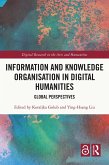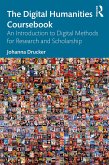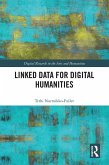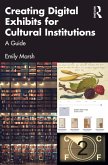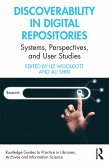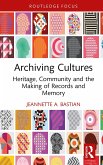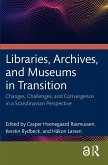Information and Knowledge Organisation in Digital Humanities (eBook, PDF)
Global Perspectives
Redaktion: Golub, Koraljka; Liu, Ying-Hsang
0,00 €
0,00 €
inkl. MwSt.
Sofort per Download lieferbar

0 °P sammeln
0,00 €
Als Download kaufen

0,00 €
inkl. MwSt.
Sofort per Download lieferbar

0 °P sammeln
Jetzt verschenken
Alle Infos zum eBook verschenken
0,00 €
inkl. MwSt.
Sofort per Download lieferbar
Alle Infos zum eBook verschenken

0 °P sammeln
Information and Knowledge Organisation in Digital Humanities (eBook, PDF)
Global Perspectives
Redaktion: Golub, Koraljka; Liu, Ying-Hsang
- Format: PDF
- Merkliste
- Auf die Merkliste
- Bewerten Bewerten
- Teilen
- Produkt teilen
- Produkterinnerung
- Produkterinnerung

Bitte loggen Sie sich zunächst in Ihr Kundenkonto ein oder registrieren Sie sich bei
bücher.de, um das eBook-Abo tolino select nutzen zu können.
Hier können Sie sich einloggen
Hier können Sie sich einloggen
Sie sind bereits eingeloggt. Klicken Sie auf 2. tolino select Abo, um fortzufahren.

Bitte loggen Sie sich zunächst in Ihr Kundenkonto ein oder registrieren Sie sich bei bücher.de, um das eBook-Abo tolino select nutzen zu können.
Information and Knowledge Organisation explores the role of knowledge organisation in the digital humanities. By focusing on how information is described, represented and organised in both research and practice, this work furthers the transdisciplinary nature of digital humanities.
- Geräte: PC
- ohne Kopierschutz
- eBook Hilfe
- Größe: 9.96MB
Andere Kunden interessierten sich auch für
![Information and Knowledge Organisation in Digital Humanities (eBook, ePUB) Information and Knowledge Organisation in Digital Humanities (eBook, ePUB)]() Information and Knowledge Organisation in Digital Humanities (eBook, ePUB)0,00 €
Information and Knowledge Organisation in Digital Humanities (eBook, ePUB)0,00 €![The Digital Humanities Coursebook (eBook, PDF) The Digital Humanities Coursebook (eBook, PDF)]() Johanna DruckerThe Digital Humanities Coursebook (eBook, PDF)37,95 €
Johanna DruckerThe Digital Humanities Coursebook (eBook, PDF)37,95 €![Linked Data for Digital Humanities (eBook, PDF) Linked Data for Digital Humanities (eBook, PDF)]() Terhi Nurmikko-FullerLinked Data for Digital Humanities (eBook, PDF)41,95 €
Terhi Nurmikko-FullerLinked Data for Digital Humanities (eBook, PDF)41,95 €![Creating Digital Exhibits for Cultural Institutions (eBook, PDF) Creating Digital Exhibits for Cultural Institutions (eBook, PDF)]() Emily MarshCreating Digital Exhibits for Cultural Institutions (eBook, PDF)33,95 €
Emily MarshCreating Digital Exhibits for Cultural Institutions (eBook, PDF)33,95 €![Discoverability in Digital Repositories (eBook, PDF) Discoverability in Digital Repositories (eBook, PDF)]() Discoverability in Digital Repositories (eBook, PDF)34,95 €
Discoverability in Digital Repositories (eBook, PDF)34,95 €![Archiving Cultures (eBook, PDF) Archiving Cultures (eBook, PDF)]() Jeannette A. BastianArchiving Cultures (eBook, PDF)20,95 €
Jeannette A. BastianArchiving Cultures (eBook, PDF)20,95 €![Libraries, Archives, and Museums in Transition (eBook, PDF) Libraries, Archives, and Museums in Transition (eBook, PDF)]() Libraries, Archives, and Museums in Transition (eBook, PDF)0,00 €
Libraries, Archives, and Museums in Transition (eBook, PDF)0,00 €-
-
-
Information and Knowledge Organisation explores the role of knowledge organisation in the digital humanities. By focusing on how information is described, represented and organised in both research and practice, this work furthers the transdisciplinary nature of digital humanities.
Dieser Download kann aus rechtlichen Gründen nur mit Rechnungsadresse in A, B, BG, CY, CZ, D, DK, EW, E, FIN, F, GR, HR, H, IRL, I, LT, L, LR, M, NL, PL, P, R, S, SLO, SK ausgeliefert werden.
Produktdetails
- Produktdetails
- Verlag: Taylor & Francis eBooks
- Seitenzahl: 314
- Erscheinungstermin: 24. Dezember 2021
- Englisch
- ISBN-13: 9781000521153
- Artikelnr.: 63069283
- Verlag: Taylor & Francis eBooks
- Seitenzahl: 314
- Erscheinungstermin: 24. Dezember 2021
- Englisch
- ISBN-13: 9781000521153
- Artikelnr.: 63069283
- Herstellerkennzeichnung Die Herstellerinformationen sind derzeit nicht verfügbar.
Koraljka Golub is a Professor in Information Studies at Linnaeus University in Sweden. Her research focusses on knowledge organisation of digital document collections, especially on subject access. Ying-Hsang Liu is a Senior Researcher in Information Studies at Oslo Metropolitan University in Norway. His research lies at the intersections of knowledge organisation, interactive information retrieval and human information behaviour.
Foreword; Preface; Chapter 1: Knowledge Organisation for Digital
Humanities: An Introduction; PART I. MODELLING AND METADATA; Chapter 2:
Modelling Cultural Entities in Diverse Domains for Digital Archives ;
Chapter 3: Collection-Level and Item-Level Description in the Digital
Environment: Alignment of Conceptual Models IFLA LRM and RiC-CM ; Chapter
4: Linked Open Data and Aggregation Infrastructure in the Cultural Heritage
Sector: A Case Study of SOCH, a Linked Data Aggregator for Swedish Open
Cultural Heritage; Chapter 5: A Semantic Enrichment Approach to Linking and
Enhancing Dunhuang Cultural Heritage Data; Chapter 6: Semantic Metadata
Enrichment and Data Augmentation of Small Museum Collections Following the
FAIR Principles; Chapter 7: Digital Research, the Legacy of Form and
Structure and the ResearchSpace System; PART II. INFORMATION MANAGEMENT;
Chapter 8: Research Access to In-copyright Texts in the Humanities;
Chapter 9: SKOS as a Key Element for Linking Lexicography to Digital
Humanities; Chapter 10: Linked Data Strategies for Conserving Digital
Research Outputs: The Shelf Life of Digital Humanities; PART III: PLATFORMS
AND TECHNIQUES; Chapter 11: Heritage Metadata: A Digital Periegesis;
Chapter 12: Machine Learning Techniques for the Management of Digitised
Collections; Chapter 13: Exploring Digital Cultural Heritage through
Browsing; Index.
Humanities: An Introduction; PART I. MODELLING AND METADATA; Chapter 2:
Modelling Cultural Entities in Diverse Domains for Digital Archives ;
Chapter 3: Collection-Level and Item-Level Description in the Digital
Environment: Alignment of Conceptual Models IFLA LRM and RiC-CM ; Chapter
4: Linked Open Data and Aggregation Infrastructure in the Cultural Heritage
Sector: A Case Study of SOCH, a Linked Data Aggregator for Swedish Open
Cultural Heritage; Chapter 5: A Semantic Enrichment Approach to Linking and
Enhancing Dunhuang Cultural Heritage Data; Chapter 6: Semantic Metadata
Enrichment and Data Augmentation of Small Museum Collections Following the
FAIR Principles; Chapter 7: Digital Research, the Legacy of Form and
Structure and the ResearchSpace System; PART II. INFORMATION MANAGEMENT;
Chapter 8: Research Access to In-copyright Texts in the Humanities;
Chapter 9: SKOS as a Key Element for Linking Lexicography to Digital
Humanities; Chapter 10: Linked Data Strategies for Conserving Digital
Research Outputs: The Shelf Life of Digital Humanities; PART III: PLATFORMS
AND TECHNIQUES; Chapter 11: Heritage Metadata: A Digital Periegesis;
Chapter 12: Machine Learning Techniques for the Management of Digitised
Collections; Chapter 13: Exploring Digital Cultural Heritage through
Browsing; Index.
Foreword; Preface; Chapter 1: Knowledge Organisation for Digital
Humanities: An Introduction; PART I. MODELLING AND METADATA; Chapter 2:
Modelling Cultural Entities in Diverse Domains for Digital Archives ;
Chapter 3: Collection-Level and Item-Level Description in the Digital
Environment: Alignment of Conceptual Models IFLA LRM and RiC-CM ; Chapter
4: Linked Open Data and Aggregation Infrastructure in the Cultural Heritage
Sector: A Case Study of SOCH, a Linked Data Aggregator for Swedish Open
Cultural Heritage; Chapter 5: A Semantic Enrichment Approach to Linking and
Enhancing Dunhuang Cultural Heritage Data; Chapter 6: Semantic Metadata
Enrichment and Data Augmentation of Small Museum Collections Following the
FAIR Principles; Chapter 7: Digital Research, the Legacy of Form and
Structure and the ResearchSpace System; PART II. INFORMATION MANAGEMENT;
Chapter 8: Research Access to In-copyright Texts in the Humanities;
Chapter 9: SKOS as a Key Element for Linking Lexicography to Digital
Humanities; Chapter 10: Linked Data Strategies for Conserving Digital
Research Outputs: The Shelf Life of Digital Humanities; PART III: PLATFORMS
AND TECHNIQUES; Chapter 11: Heritage Metadata: A Digital Periegesis;
Chapter 12: Machine Learning Techniques for the Management of Digitised
Collections; Chapter 13: Exploring Digital Cultural Heritage through
Browsing; Index.
Humanities: An Introduction; PART I. MODELLING AND METADATA; Chapter 2:
Modelling Cultural Entities in Diverse Domains for Digital Archives ;
Chapter 3: Collection-Level and Item-Level Description in the Digital
Environment: Alignment of Conceptual Models IFLA LRM and RiC-CM ; Chapter
4: Linked Open Data and Aggregation Infrastructure in the Cultural Heritage
Sector: A Case Study of SOCH, a Linked Data Aggregator for Swedish Open
Cultural Heritage; Chapter 5: A Semantic Enrichment Approach to Linking and
Enhancing Dunhuang Cultural Heritage Data; Chapter 6: Semantic Metadata
Enrichment and Data Augmentation of Small Museum Collections Following the
FAIR Principles; Chapter 7: Digital Research, the Legacy of Form and
Structure and the ResearchSpace System; PART II. INFORMATION MANAGEMENT;
Chapter 8: Research Access to In-copyright Texts in the Humanities;
Chapter 9: SKOS as a Key Element for Linking Lexicography to Digital
Humanities; Chapter 10: Linked Data Strategies for Conserving Digital
Research Outputs: The Shelf Life of Digital Humanities; PART III: PLATFORMS
AND TECHNIQUES; Chapter 11: Heritage Metadata: A Digital Periegesis;
Chapter 12: Machine Learning Techniques for the Management of Digitised
Collections; Chapter 13: Exploring Digital Cultural Heritage through
Browsing; Index.

